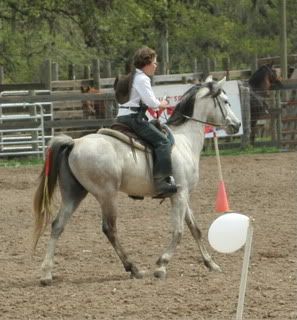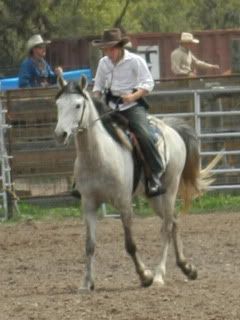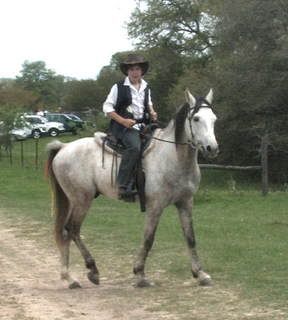Details, details...
 We attended our first CMSA competition this weekend, and while it could have gone better in some ways, there were also some wonderful highlights and it was, overall, a tremendous learning experience.
We attended our first CMSA competition this weekend, and while it could have gone better in some ways, there were also some wonderful highlights and it was, overall, a tremendous learning experience.First, I have to brag. This was the first time that my son has ridden our young stallion, GWAIHIR, in any kind of competition and I was extraordinarily pleased at how well they worked together. Especially since he didn't work so well for me earlier in the morning!
As with anything, this sport takes some work and practice and some getting your feet wet. I can listen and watch and learn, but I'm still the kind of person that has to go through the fire before I can figure out the right questions to ask.

And this weekend reminded me of how much fun the real little picky and flavorful details can be.
There are often times, in our writing, that it's ok to gloss over something or to use a common description to fill in background, but it seems to be the little things that really hook the readers and draw them in. To me, it isn't so much the easily-findable facts about the way things work, but when an author drops in a troublesome tidbit about something that didn't work - that seems to really give the story life and depth.
I drive a lot of miles going to our events, the majority of them are off the beaten path so it's a rare trip that doesn't have some element of adventure:
- like driving around a small town traffic circle looking for (according to your directions) Hwy64 North when the signs only offer 64 East or West;
- or finding a narrow unmarked road at the exact mileage the directions say you should find a well-traveled county road;
- what about those little towns that mount street lights directly in front of their state highway signs so you can't be sure if you're on 171 or 174 until you pass the next sign.
- and the funny thing about driving an older truck is that you learn to watch the temperature gauge instead of the speedometer. If you don't have quite enough truck for the trailer, you learn to go very fast down the long hills so you can make it to the crest going back up the other side. ... I've also learned, the hard way, not to be nice and pull over and drive on the shoulder to let people pass. Too many times I've done that and ended up with flat tires before the end of the trip.
Horses have to learn to travel. They typically need a few trips to learn to relax in the trailer. Some horses don't eat well during a trip (which can start a cascade of health issues), and most horses won't drink when you offer them water at a stop. A nervous traveler will sweat from the stress of the trip and can potentially worry themselves sick. Some will paw or dig with their hoofs on the side or floor of the trailer, some will kick. Horses are nothing if not creatures of habit and most, if not all of these behaviors tend to disappear after a few long trips. Most horses seem to prefer to ride in the trailer facing backwards and will turn around if you have the kind of trailer that you can leave them untied.
This also applies to going new places. Until a horse has traveled a certain extent, they will likely be overly alert. It takes a few trips for a young horse, or any untraveled horse, to learn what sorts of things are prone to jump out and try to eat them and which are not.
 Compare GWAIHIR's sideways ears in the photo above to WITNESS's 'alert' photo in the post below. GWAIHIR is listening. He is fairly well-traveled and is alert and cautious but not overly concerned. Off-screen to his right the SASS competition is going on, multiple shooters (30? ...or more at a time with handguns and rifles) and there are strangers and unknown horses behind those trees and mounted shooting going on forward and to his right.
Compare GWAIHIR's sideways ears in the photo above to WITNESS's 'alert' photo in the post below. GWAIHIR is listening. He is fairly well-traveled and is alert and cautious but not overly concerned. Off-screen to his right the SASS competition is going on, multiple shooters (30? ...or more at a time with handguns and rifles) and there are strangers and unknown horses behind those trees and mounted shooting going on forward and to his right.When you ride alone, you'll often see a horse hold one ear forward and one ear back, or if they hold them both forward, or back, they'll flick one to the side and back every few strides, more often the more concerned they are about the location.
Sue L


1 comment:
Wow, lots of details here to think about when writing ... horses like facing backwards in trailers. I wonder if it's a balance issue?
No wonder Gwahir's ears are twitching with all that going on around him, it's amazing any horse (or rider) could concentrate.
LOL about trying to find the right road - taken a few wrong turns myself, but hubby always explained it to the kids that we were 'touring' and 'exploring' rather than getting into a tizzy. Except when he ended up taking a wrong turn in New York city and ended up in the middle of Harlem, or got on the wrong subway and ended up out in Queens. But then a guy never stops to ask for directions or reads a map the way you were trying.
Post a Comment